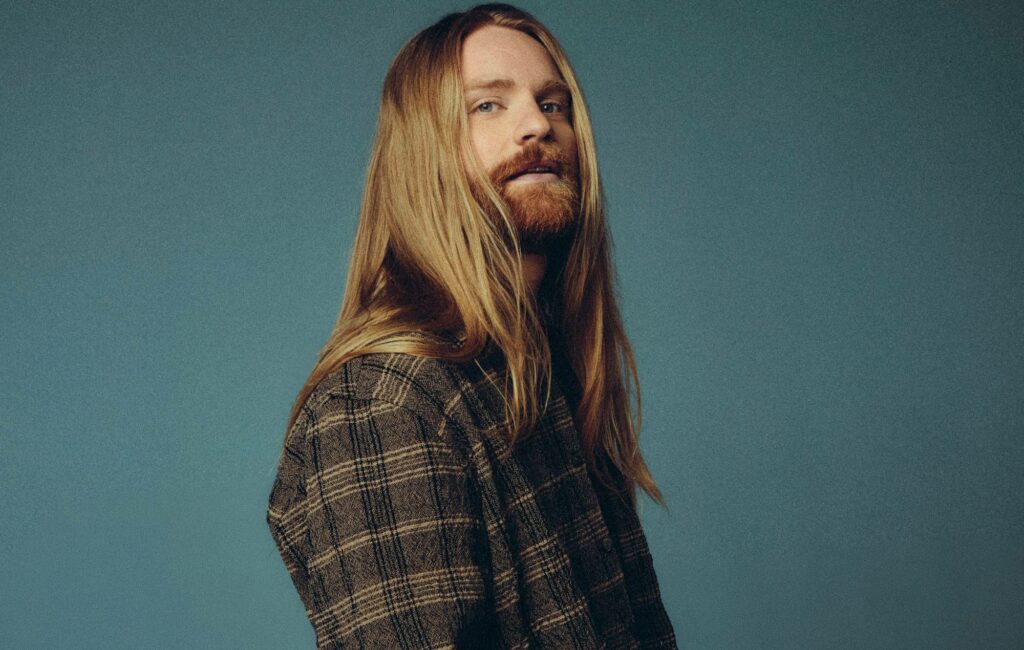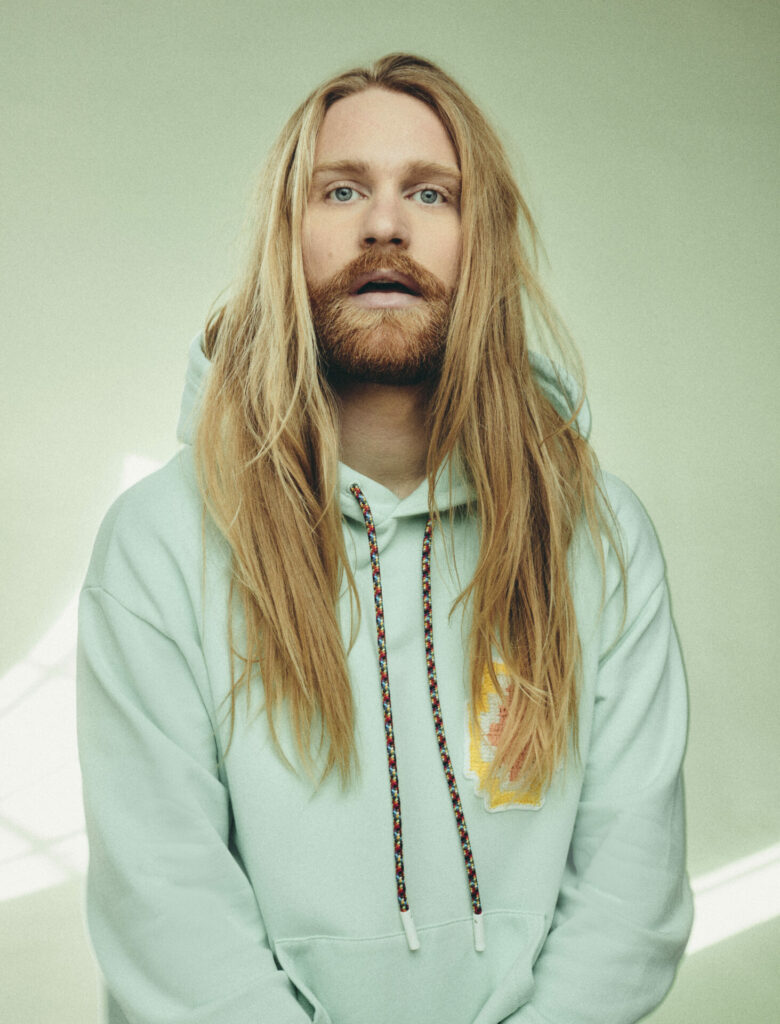Sam Ryder is the UK’s brightest Eurovision hope in years
As Sam Ryder prepares to take to the Eurovision stage in Turin, he tells Rolling Stone UK how he became our greatest chance of victory in a decade
By Nick Reilly

When James Newman suffered the indignity of receiving the dreaded nil points at last year’s Eurovision in Rotterdam, the face of the UK entrant said it all about this country’s fractured relationship with the contest.
Newman wasn’t too disappointed, it seemed, but instead happy to grin down the barrel of the TV camera as he kicked back with friends. And who could blame him? His last place finish would barely register with the public back home. It was, after all, the latest in a long string of failures that have left many wondering whether there’s any point of sending a UK entrant every year.
But 12 months later, things have dramatically changed. In 32-year-old Essex singer Sam Ryder, the UK has seemingly chosen its brightest hope since Katrina & the Waves triumphed some 25 years ago. Days before the grand final in Turin, he is the third favourite to win – pipped only by last year’s victors Italy and a Ukrainian folk entry that, for quite obvious reasons, is expected to emerge triumphant.
So what’s changed? There is the small matter of the UK overhauling the way that acts are chosen. This year sees BBC Studios enlisting the involvement of TaP music – the management firm founded by Ben Mawson and Ed Millett which oversaw Dua Lipa’s rise to global fame before they parted ways earlier this year.
“I think there’s been a huge shift in [the UK’s approach to Eurovision]. It would be mad to not look at the mechanics of that, how we’re finding artists and getting that person onto the stage… Because, let’s be honest, what have we got to lose?”
— Sam Ryder
Ryder first came on TaP’s radar when his entry ‘Space Man’, which he recorded in mid-2020, ended up in their inbox earlier this year. Co-written by frequent Ed Sheeran collaborator Amy Wadge and Max Wolfgang, it’s the strongest song that the UK has sent in a decade.
“I think there’s been a huge shift in our method,” Ryder says of the UK’s new and improved approach to Eurovision. “It would be mad to not look at the mechanics of that, how we’re finding artists and getting that person onto the stage. What does that situation look like? Because, let’s be honest, what have we got to lose?”

But a good song is nothing without a great singer, and Ryder’s impressive vocal range proves that he’s a huge talent in his own right. He became a TikTok sensation during the first lockdown when his covers of Justin Bieber and Alicia Keys showed off those pipes and attracted million of views as well as the attention of those stars in the process.
“In lockdown, I didn’t want to overthink music,” he tells Rolling Stone UK. “No gimmicks, bells and whistles, no distractions and obstacles. I just wanted someone to scroll and they’d see this guy red in the face from singing his head off, singing straight into the speaker of his phone. It was as simple as that.”
His Eurovision entry allows those vocals to soar once more. Anchored by a stadium-sized chorus that is bound to grab the hearts of the continent, it is an Elton-esque wonder that offers an emotional homage to the power of dreamers.
“I love Megadeth… that style of music was so crucial to me, and still is”
— Sam Ryder
Describing their decision to choose Ryder, Mawson and Millett told Rolling Stone UK: “We believe that we can’t blame politics – we’ve wanted to focus on finding the right artist and the right song and we believe Sam has both – as well as the most incredible live vocal and wonderfully endearing personality. Whatever happens on the night, he’s the most incredible talent and we’re proud to have played a part in his journey alongside his fantastic manager David May.”
Ryder’s own musical awakening occurred in his early teens when a trip to a nunnery during his time at a Catholic secondary school involved an unlikely discovery of heavy metal.
“We were on the bus and I found an CD of Iron Maiden’s Seventh Son of a Seventh Son, which is still one of my favourite Maiden albums,” he explains. “The CD was absolutely battered and the only track that would work was ‘The Evil That Men Do’. I was sitting there blasting it with the bass boost on and it changed my life that day. I love Megadeth too, that style of music was so crucial to me, and still is.”
While ‘Space Man’ couldn’t sound more different to the guitar-driven sounds of Maiden and Megadeth, those bands certainly shaped Ryder’s earlier career. He spent years trying to find his big break in a series of hair metal bands that secured middling slots at Download Festival, with his long blonde locks and thick beard hinting at the experiences of those earlier years.
“I’ve been in my fair share of bad bands and did that thing where you play and play and play until the wheels fall off,” he says. “You’re singing to empty pubs and clubs for years but you always love it. Of course you have dreams of stepping out on a stage and there’s folk there, but it’s not the be all and end all. If you love it, you’ll do it regardless and you’ll never stop. But the only thing that started creeping in for me before lockdown was this thing of overthinking and being too strategic, that would get in the way of the music a bit. I would make something and spend so much time on it that I’d suck the life out of it and then never share it. You’ve wasted your time and energy on something and your relationship with music deteriorates because of that.”
“[‘Space Man’] seemed to arrive in ten minutes, which is a songwriter’s dream, because the good ones are those that feel like you had no part in it”
— Sam Ryder
In contrast, he says that ‘Space Man’ seemed to emerge “out of thin air – or, space, man!”
“It seemed to arrive in ten minutes, which is a songwriter’s dream, because the good ones are those that feel like you had no part in it. They’re the days that remind you how grateful you should be to be a songwriter. It’s such a gift.”
Next up then, is Saturday night’s performance. Rehearsal footage shows that Ryder’s song will be matched by equally strong staging which will see him flanked by a futuristic Crystal Maze-esque creation. He is also due to perform in the show’s second half, which, as die-hard Eurovision fans reliably tell me, is traditionally seen as a boost to winning.
If he does win, Ryder could be on the path to becoming one of Britain’s pop stars, with the shackles of Eurovision shaken off. Italian rockers Måneskin became one of the continent’s hottest prospects last year after winning with the Stooges-esque stomper ‘Zitti E Buoni’. A main stage appearance at Reading & Leeds festival now awaits them this summer, while a huge date at London’s O2 Arena follows next year.
But, whatever, the outcome, Ryder says he has avoided all talk of odds being slashed and his immediate plans for the day after Eurovision are, unlike his song, to remain firmly on the ground. “Whatever happens, I’m going to go home the next day and have a curry with my mum, dad, grandad, partner and sisters. That’s the real gorgeous moment, that’s what brings me joy. Regardless of where I come on that board that will still be there. You’ll be the richest person on Earth if you’re able to do that.”
